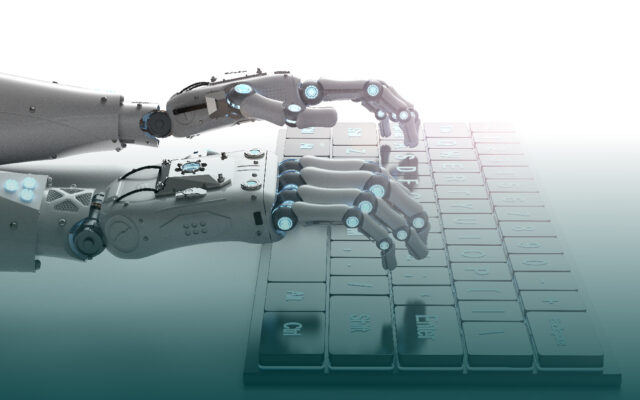As a business leader, you understand how important it is for modern companies to enhance efficiency and reduce costs. Changing economic conditions, unstable markets, and growing client demands prompt businesses to look for innovative solutions to their problems.
While traditional automation has served us well, it may not be enough to address the challenges of today’s dynamic business context. This is where intelligent automation appears as a strategic option, taking companies beyond simple task automation.
In this article, we will dive into the notion of intelligent automation (IA), discuss the benefits, implementations, and components of IA solutions. After reading it, you will better understand how intelligent process automation can revolutionize your business and what steps you should take to start the big change.
Intelligent Automation Definition
Intelligent automation (IA) is the combination of artificial intelligence and software automation. In 2023, the intelligent process automation market size reached $15.06 billion and is projected to grow to $51.35 billion by 2032.
The concept of IA is used to denote self-improving systems that enhance business operations. At its core, intelligent automation solutions aim to take traditional automation to the next level by integrating advanced AI capabilities. They allow software to perform repetitive tasks and adapt to more complex ones over time.
The fundamental component of intelligent automation solutions is robotic process automation (RPA). RPA involves the use of software robots to handle repetitive and labor-intensive tasks such as filling out forms, searching data, sorting invoices, etc.
These software robots interact with digital systems much like humans do, following predefined rules to execute tasks quickly and accurately. However, what sets an intelligent automation solution apart is its ability to make these RPA bots smarter.
By incorporating technologies such as natural language processing (NLP), generative AI, and optical character recognition (OCR), automation intelligence enables these bots to handle more complex tasks that require understanding and decision-making capabilities.
For instance, NLP allows bots to interpret and respond to human language, making it possible to automate customer service interactions or process documents in various languages. OCR technology enables bots to read and process text from images, which is particularly useful for digitizing paper documents.
Thus, intelligent automation represents a significant step forward in the evolution of business operations, offering companies the tools they need to stay competitive in an increasingly automated world. By combining the power of AI tools and automation, businesses can achieve greater efficiency, accuracy, and adaptability in their workflows.
How Intelligent Automation Technology Works
Intelligent automation technology works based on several key components, including artificial intelligence (AI), machine learning (ML), natural language processing (NLP), computer vision, and optical character recognition (OCR).
Here’s a closer look at how these components are combined to power intelligent automation:
Artificial Intelligence
The latest AI trends and the evolution of this technology lay the foundation of intelligent automation. Unlike traditional automation tools, AI-powered automation tools learn from data and user interactions. It can also recognize patterns and adapt to solve new, complex problems. This dynamic learning capability makes AI-powered automation particularly useful in environments that evolve and change over time.
Machine Learning
ML algorithms can analyze patterns and historical data. This capability helps intelligent automation platforms predict outcomes and make data-driven decisions. As these systems process large volumes of historical data, they train themselves to create more precise and efficient workflows, continually improving without human intervention.
Natural Language Processing
NLP technology can process text data from sources like social media posts, emails, and texts, detecting trends and facilitating real-time human communication. In intelligent automation, NLP enhances the automated analysis of large text-based documents and improves customer engagement by enabling the system to comprehend and respond to customer inquiries more effectively.
Computer Vision
Computer vision allows software to achieve human-level accuracy in identifying people, objects, and scenes in images. This technology automates the extraction, identification, and classification of visual data. By feeding a continuous stream of new images into the intelligent automation platform, computer vision helps in fields such as medical imaging, manufacturing process control, and autonomous driving etc.
Optical Character Recognition
Optical character recognition (OCR) technology converts images of text into machine-readable text, enabling the automation system to process and act upon information that would otherwise be locked in image files. OCR allows businesses to integrate scanned physical documents, such as hand-filled reports, forms, legal documents, and handwritten notes, into their digital workflows, enhancing overall efficiency.
In summary, the integration of these components creates a transformative intelligent automation solution that streamlines processes and simplifies workflows. The holistic approach not only enhances operational efficiency but also improves the overall employee experience, giving them the chance to move from repetitive tasks to higher-value activities.
Need help with implementing these technologies into your infrastructure to achieve automation and efficiency?
Get in touch with Forbytes for a free consultation. After a deep investigation of your business processes, we will present you with a personalized strategy for smart automation.
Benefits of Intelligent Process Automation
Intelligent automation offers numerous advantages across various industries by leveraging large data volumes, precise calculations, and advanced analysis for business implementation.
As a result, more and more companies are considering this solution as a prospective investment area. 2023 marked a 17% increase in intelligent automation investments, according to the State of Intelligent Automation Report.
Here are the key intelligent automation benefits:
Cost reduction and productivity improvement
Intelligent automation helps reduce costs by aiding employees and enhancing their productivity. It allows businesses to scale operations swiftly with the help of technology, without increasing risk, raising expenses, or overburdening their existing workforce.
Enhanced accuracy and quality
Automation intelligence brings a consistent approach to repetitive tasks, driven by AI. This process enhances accuracy and boosts the overall quality of outputs. Automated decision-making ensures that tasks are performed the same way every time, reducing the likelihood of errors and increasing reliability.
Improved customer experience
With intelligent automation platforms, companies can deliver higher-quality products faster and provide quicker responses to customer queries. This leads to a richer, more positive customer experience, giving businesses a competitive edge. AI implementation in chatbots, companies can provide 24/7 support, ensuring that customers receive immediate assistance and personalized recommendations.
Compliance and regulatory confidence
Many industries must adhere to stringent regulatory policies. IA helps ensure compliance by automating tasks that require a consistent approach to regulatory adherence. This reduces the risk of non-compliance and allows companies to confidently meet regulatory requirements.
Data-driven insights and strategic decision-making
An intelligent automation solution continuously collects, processes, and analyzes data. This ongoing data stream enables IA to provide data-driven insights, helping businesses make informed and strategic decisions. Over time, this approach streamlines business processes and enhances overall efficiency.
Reduction of manual tasks and human errors
By automating repetitive business processes, IA reduces the manual time spent on such tasks and minimizes human errors.
As Forbytes’ experience of building business solutions shows, the integration of ChatGPT or other smart tools into work processes can save time and money, decrease resource expenditure, and enhance overall workflow efficiency.
In summary, companies that adopt intelligent automation software can stay competitive in a rapidly evolving market while optimizing their resources and workflows.
Get in touch with us for a free consultation where we will instruct you on how to use automated AI to supercharge your business.
How Intelligent Automation Solutions Are Used in Different Industries
IA revolutionizes processes traditionally reliant on manual tasks or outdated legacy systems, which are often resource-intensive, costly, and prone to human error.
The applications of intelligent automation software span across various industries, including the following:
Automotive
The automotive industry benefits significantly from AI-driven automation. This technology enables manufacturers to predict and adjust production in response to fluctuations in supply and demand.
By streamlining workflows, the technology increases efficiency and reduces the risk of errors in production, support, procurement, and other critical areas. The use of robots reduces the need for manual labor and enhances defect detection, resulting in higher-quality products at lower costs.
Life Sciences
In the life sciences sector, drug production is highly regulated and requires precise calibration of equipment and meticulous measurement of products. This field also involves extensive data collection, collation, processing, and analysis.
Intelligent automation tools ensure that drug trials yield reliable analysis and results by minimizing calculation errors and reducing the need for extensive manpower and resources.
The rapid development and production of vaccines demonstrate how this powerful technology can expedite production speed and improve quality. Historically, discovering a single marketable drug could take decades and involve numerous scientists. IA dramatically shortens this timeline by automating key processes.
Healthcare
The healthcare industry leverages enterprise intelligence automation software to standardize data collection, analysis, diagnosis, and treatment.
The technology enables the use of chatbots in remote healthcare appointments, reducing the need for human intervention and often leading to faster diagnoses. This approach improves the overall quality of care and patient satisfaction.
Insurance
In the insurance sector, intelligent automation eliminates the need for manual rate calculations and payments. It simplifies the processing of paperwork, such as claims and appraisals, making these tasks more efficient and accurate.
It also helps insurance companies adhere to compliance regulations by ensuring that all requirements are consistently met. Additionally, such tools can calculate the risk profiles of individuals or entities and determine appropriate insurance rates with greater precision.
Examples of Intelligent Automation at Work
The results that intelligent business process automation can bring encourage businesses to spend a significant part of their overall budget on upgrading their systems, solutions, and operations. As the Intelligent Automation Network Trends & Spends Report shows, 42% of the respondents who took part in the survey allocate around 25-50% of their budget toward smart automation technologies.
Across different industries, IA technology provides significant efficiencies and enhances operational effectiveness. Here are some practical intelligent automation examples:
Mortgage cross-selling
Banks are leveraging business intelligence automation to cross-sell mortgages to existing customers. Smart platforms analyze vast amounts of customer data to identify cross-selling opportunities.
For instance, the system can alert bankers when customers exhibit behaviors indicative of home buying, such as a change in job status reflected by a new source of deposits. Once notified, bankers can reach out to these customers using the most effective communication methods tailored to their data profiles.
Procure-to-Pay (P2P)
Traditional procure-to-pay (P2P) processes are often repetitive and time-consuming, involving tasks like vendor evaluation, selection, and extracting invoice and payment data from multiple sources and systems. Many organizations turn to smart automation to enhance the efficiency and cost-effectiveness of their procurement processes.
Intelligent robotic process automation integrates various P2P tasks, such as purchase requisitions, purchase orders, invoice approvals, and vendor management, reducing manual effort and streamlining operations.
Employee onboarding and offboarding
Onboarding and offboarding employees are resource-intensive processes involving numerous tasks, such as training, completing paperwork, and managing access to company resources.
AI automation ensures that all necessary onboarding and offboarding tasks are completed efficiently. New hires receive the required tools and access for their roles, while offboarding processes ensure secure and smooth transitions, including processing final payments and retrieving company property.
Quote-to-Cash process
A fast and efficient quote-to-cash (Q2C) process is crucial for maintaining cash flow in any organization. Many businesses still rely on manual processing for sending quotes, fulfilling orders, billing customers, and receiving payments, which is slow and error-prone.
Automation intelligence streamlines the Q2C process and automatically extracts information from documents such as contracts and invoices. Automating tasks like order fulfillment, new customer onboarding, and account provisioning allows employees to focus on higher-value activities like generating sales and enhancing customer service.
Customer Relationship Management (CRM)
Despite its long history, CRM software often creates inefficiencies, requiring sales teams to search for and enter data manually. This, in turn, distracts them from engaging with customers.
A smart solution can eliminate these manual tasks, enabling representatives to focus on strategic work and sales. Key AI automation features include contact management, which integrates customer data from various apps, and advanced analytics for creating detailed sales forecasts and making data-driven decisions.
Need effective implementation of intelligent automation in your domain? Contact Forbytes and get the help of expert software engineers.
Inventory control
Traditional inventory control involves extensive manual processing, which is no longer feasible for organizations employing omnichannel marketing and sales strategies. Automated inventory control systems streamline back-office processes, including generating work orders, creating invoices, and managing shipping.
An intelligent automation solution allows organizations to automate supply chains, track inventory, handle fulfillment, and synchronize omnichannel order and inventory data. This is increasingly critical as companies diversify their product and service offerings.
Product Lifecycle Management
Effective product lifecycle management is vital due to the complexity and dynamic nature of modern work environments.
Intelligent process automation offers numerous benefits, such as identifying workflow bottlenecks, managing raw materials, streamlining communication channels, improving inventory management, and reducing administrative costs. These efficiencies ensure smoother operations and quicker development cycles.
Quality management
Manual quality management processes are challenging to control and lack visibility, often leading to hidden costs that can amount to a significant portion of the total cost of goods sold.
Hyperautomation provides a centralized view of performance data and employee tasks, enabling quicker and more accurate quality tests. Integrating intelligent automation with document management systems further enhances quality control processes.
Campaign and advertising approvals
Managing marketing campaigns across multiple channels is time-consuming and costly. AI automation creates workflows for automated approval processes, allowing marketing team members to submit requests electronically. The designated approver can then route, approve, and notify the employee, enabling campaigns to launch in hours rather than days or weeks.
How Can Forbytes Enhance Your Intelligent Automation Journey?
Intelligent automation solutions are revolutionizing how businesses operate, providing unprecedented opportunities for efficiency, accuracy, and innovation. They not only reduce operational costs but also enhance productivity, improve customer experiences, and ensure compliance with regulatory standards.
At Forbytes, we understand that navigating the journey of intelligent automation (IA) can be complex and challenging. We are dedicated to supporting your intelligent automation journey from start to finish. Our tailored solutions, seamless integrations, continuous support, and focus on scalability and security ensure you can fully enjoy the benefits of intelligent automation.
Partner with us to transform your business processes, enhance efficiency, and stay ahead in a competitive market.













